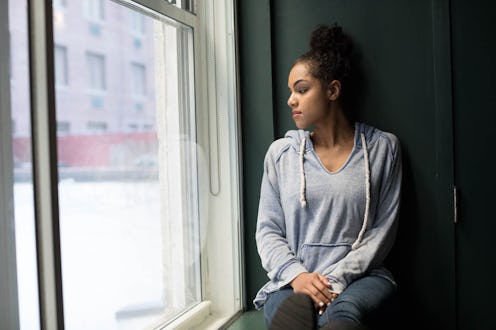Life
7 Unexpected Ways Loneliness Affects Your Health

When most of us think of loneliness, we think of sitting by ourselves in our room, aching for companionship or being left with our negative thoughts. But loneliness can also manifest itself in other ways, and there are a number of health symptoms that can be signs of loneliness. Because our body and minds are connected, and social support is so important for mental health, feeling isolated can cause some health issues that at first glance seem unrelated to how connected we are to the world.
"We were created to need one another," psychotherapist Gin Love Thompson, PhD tells Bustle. "Although the need for social interaction varies in extent for each person depending upon their personality, there is always a level of need for connection with others. Increased levels of stress resulting from loneliness can cause cortisol levels to be released in excess which contributes to a myriad of health problems, including autoimmune disorders."
You won't be able to cure all your health issues by spending time with others, but making sure you have a healthy social circle may be able to help. And if these health issues persist, speaking with your doctor or a therapist can help. Here are seven health symptoms that can mean you're lonely, according to experts.
1Weakened Immune System
If you're lonely, you might find that you get sick more often. "Loneliness can increase cortisol, the stress hormone, which can affect your immune system, your blood sugars, and your thyroid function — to name just a few," psychotherapist Kelly Bos, MSW, RSW tells Bustle. Having a community can help keep you in a relaxed state and lower cortisol, which ultimately helps prevent sickness.
2Poor Quality Sleep
Loneliness has been linked to bad sleep, whether it's insomnia, sleeping too much, or poor quality of sleep overall. "Typically poor quality sleep leads to daytime fatigue and low energy levels," psychotherapist Laurie Sharp-Page, MS, LPCC-S, NCC, CWC tells Bustle. "Difficulty sleeping can be symptomatic of several mental health issues, as well as physical health issues."
3Tension Headaches
Throbbing head pains? If you are feeling lonely, it may be to blame. Feeling alone can also lead to tension headaches and migraines, according to therapist Annie Wright, LMFT. Pain tolerance can be lowered when you're lonely, which could make the pressure in your head feel that much worse.
4Irritability
Your bad mood can also be a result of social isolation. "Loneliness can create a sense of rejection, and as such, it can cause additional distress when engaging with others," says Sharp-Page. "If you find yourself consistently irritable with others, you may be assuming they will reject or hurt you, which would further your sense of loneliness."
5Addiction To Material Objects
Feeling particularly attached to your new computer or cell phone? People who are lonely tend to put an increased focus on material objects, according to research published in Journal of Consumer Research. Material possession love, as the researchers define it, involves an attachment to objects such as cars, computers, bicycles, and guns, and this passion for inanimate objects often comes as a result of loneliness.
6Lower Libido
Feeling alone can also make you withdraw from others romantically, as it can put you less in the mood. You might experience a diminished interest in sex, romance, and love, as feeling stressed or overburdened can cause your libido to go down, according to Psychology Today.
7Excess Drinking
If you're turning to the bottle more often than usual, it can also be a sign of loneliness. "Heavy drinking has been associated with loneliness, as drinking may be used to cope," says Sharp-Page. "Additionally drinking can be a solitary activity, which unfortunately can contribute to further feelings of loneliness."
When you're feeling lonely, it's not always obvious that it can affect your body in these ways. Seeking out a community or speaking with a professional and social support can help boost both your physical and mental health.
Editor's Note: If you or someone you know is seeking help for substance use, call the SAMHSA National Helpline at 1-800-662-HELP(4357).
This article was originally published on